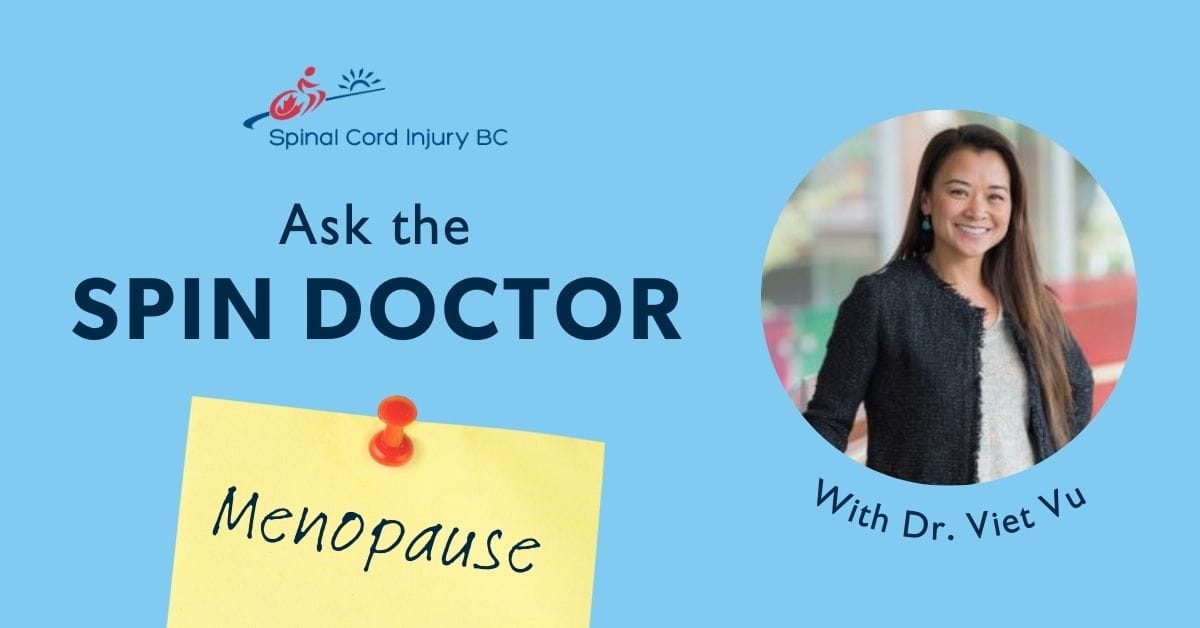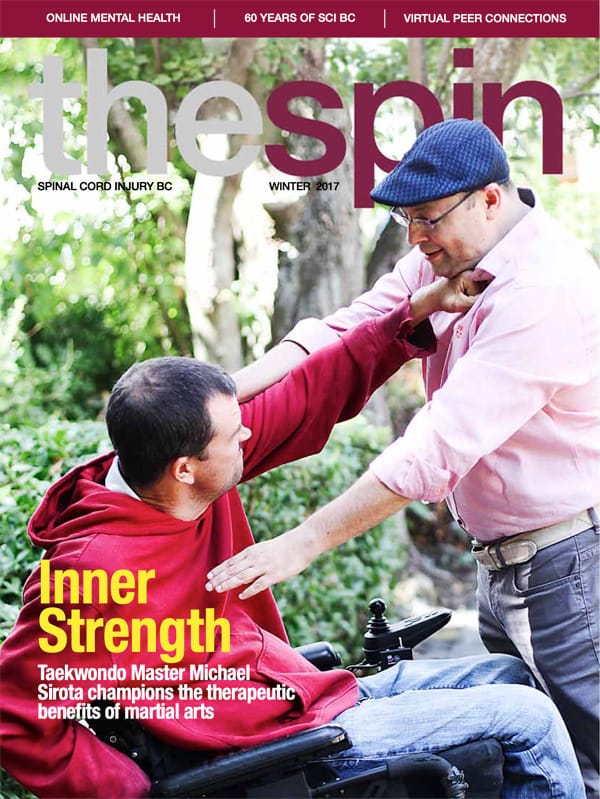
“I’m hoping someone can tell me all about the joys I can expect with my impending journey through menopause,” writes GH from Vancouver. Dr. Viet Vu, physiatrist at GF Strong and Clinical Assistant Professor in UBC’s Division of Physical Medicine & Rehabilitation, was happy to shed some light on this issue.
Ladies! Let’s talk about sex, baby!
If you can remember this 90s song from Salt-N-Pepa, then you’re likely in your 40s and nearing menopause. Not as sexy, right? My mom had it really bad. The house was kept at a near freezing temperature, her hot flashes were miserable, and she was miserable to me and my siblings.
But menopause doesn’t have to be scary.
An article I read described menopause as the ovary’s failure to produce estrogen. I believe a healthier way of viewing menopause is that it’s Mother Nature’s way of looking out for us. Can you imagine getting pregnant at 50 years old, much less 60? In order to keep us pregnancy-free in our mid-life, Mother Nature turns down the production of estrogen.

Prior to menopause, if your cycles are regular, your period occurs every 28 days. Typically, an estrogen surge results in ovulation each month around day 14 of your cycle. If the egg is not fertilized, you complete the cycle with menstruation. This goes on for decades, with the exception of pregnancy.
Over time, as estrogen levels decrease, periods become more irregular. Welcome to perimenopause. You might start recognizing symptoms of decreased energy, sleep disturbances, and irritability (but really, who doesn’t feel like this in their 40s?). Peri means near or around, as in perimeter. This is what clinicians consider as your transition into menopause.
By definition, you’re considered to be in menopause after a year without having a period.
So what does menopause look like when one has a SCI? Generally, it’s not that different than the way it appears for most women, according to at least one expert on the subject, Dr. Claire Kalpakjian at the University of Michigan. One of her recent research papers concludes, “Results suggested that women with SCI experience greater symptom bother in certain areas, but that patterns of symptom bother across menopause and transition through menopause and age at final menstrual period is similar to their (non-SCI) peers.”
There are reports that say that women with SCI will experience menopause at a younger age, and others that say, with or without SCI, menopause will occur around age 50 for most women. I say, start the clock and monitor your periods when it starts becoming irregular. Jot down in one of those small pocket calendars or your smartphone when you start your period as day one and see if your cycles are around 28 days apart. If you start missing months, or if your cycles are shorter or longer, tell your gynecologist about it. It’s important to come well-equipped and informed as to when your menses started to change and how it’s changed.
What about the classic hot flashes or, as they’re called in medical circles, vasomotor symptoms? Their exact cause is complicated and only partially understood, but suffice it to say that they appear to be triggered by a lack of estrogen in the hypothalamus, an area of the brain responsible for temperature control. Remember, not all women will have crazy hot flashes. If anything, women with SCI have reported fewer vasomotor symptoms! But keep in mind, if you’re prone to high or even low blood pressure, these may make hot flashes worse. Sweating can be affected by SCI, so the combination of hot flashes and sweating can certainly disrupt your sleep.
In addition to insomnia, other symptoms to track and record throughout menopause are decreased sex drive, lower energy level or fatigue, and aches and pains—remember that these could be caused by other problems, such as thyroid issues, anemia or even fibroids. Lastly, women with SCI report more UTIs during menopause. Why? Possibly because of the underlying neurogenic bladder combined with vaginal dryness. It’s not clear. Do stay on top of bladder management and get a urinalysis when you suspect a UTI.
So what’s next? There are ways to treat menopause symptoms. Hormone Replacement Therapy (HRT) was a common treatment for menopausal symptoms until it was discovered that it also increased rates of heart attacks, stroke, breast cancer, and blood clots. Women have to be very judicious when choosing to take HRT. Non-pharmaceutical options exist, such as eating soy products (soybeans or soymilk) that have plant estrogens. Of course, there are supplements like Vitamin D and calcium that are good to take even before menopause for bone health. This is also a great time of your life to consider committing to a healthier lifestyle. Incorporate an exercise program throughout your week to keep your heart and blood vessels healthy. Track your food intake as decreased estrogen can mean an increase in weight.
Above all, don’t despair. Dr. Christiane Northrup, author of The Wisdom of Menopause, writes, “The perimenopausal lifting of the hormonal veil—the monthly cycle of reproductive hormones that tends to keep us focused on the needs and feelings of others—can be both liberating and unsettling.” She goes on to describe menopause as a “Renaissance of your life.” I can see how the reshuffling of hormones and chemicals in our bodies at the midpoint in our lives could help us to refocus on being the stronger, wiser women we have worked so hard to become.
To discuss more about menopause, you can talk to your doctor, including your physiatrist.
This article originally appeared in the Winter 2017 issue of The Spin. Read more stories from this issue, including:
- Martial Arts
- Exercise Guidelines
- Bowel Care
- SCI BC’s 60th Anniversary
And more!




